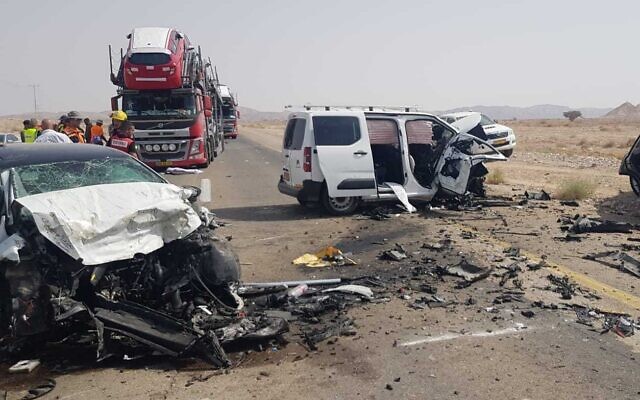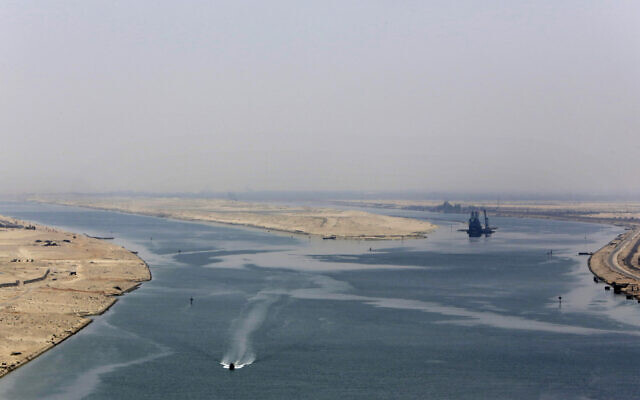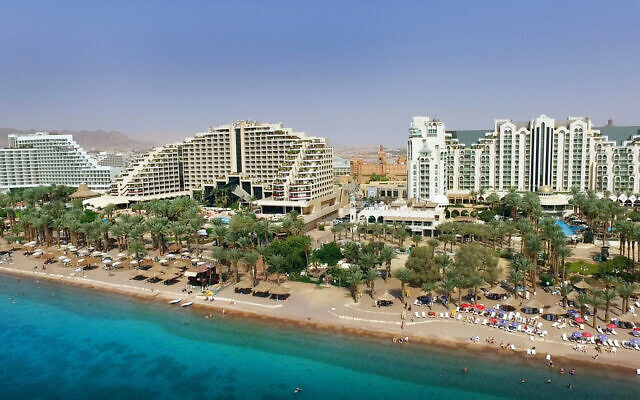Prime Minister Benjamin Netanyahu announced Sunday a NIS 100 billion ($27 billion) plan to link the northern city of Kiryat Shmona to the Red Sea resort of Eilat in the far south by rail.
He went even further, saying the line “will be able in the future to link Israel to Saudi Arabia and the Arabian Peninsula, we’re working on that too.”
Netanyahu has set normalization of relations with Saudi Arabia as a prime target, but this has appeared increasingly unlikely due to the influential far-right elements in his government. The New York Times reported Saturday, citing an Israeli official, that a normalization deal would require “significant concessions” to the Palestinians that are unlikely to be approved by the current hardline coalition.
“My vision is for every Israeli citizen to be able to travel to or from the center from anywhere in the country in less than two hours,” Netanyahu said at the start of his weekly cabinet meeting. “In most cases under an hour, and even less than that.”
Aside from swiftly moving people the approximately 400-kilometer (250-mile) distance, the line will allow the moving of goods from the Eilat port to terminals on the Mediterranean, the premier said.
Numerous such plans have been floated in the past, but none has gotten off the ground.

Prime Minister Benjamin Netanyahu,, center, leads a cabinet meeting, at the Prime Minister’s Office in Jerusalem on July 30, 2023. (Marc Israel Sellem/POOL)
Netanyahu, in his cabinet statement, made little mention of his government’s highly divisive judicial overhaul program, though he noted that the coalition would “try to reach agreements” with the opposition during the summer recess. Opposition Leader Yair Lapid quickly shot that down, saying he would not agree to negotiations unless the government freezes the plans until 2025.
Justice Minister Yariv Levin, the plan’s main architect, was absent from the meeting.
Netanyahu also said at the meeting that his government would focus on alleviating the ongoing cost of living crisis, as well as keeping Israel at the forefront of the world’s fast-developing artificial intelligence field.
Questions about practicality, funding
The plan for the fast rail network, formally approved by the cabinet on Sunday, would see some of the trains running at speeds of up to 250 kilometers (155 miles) per hour.
To plug gaps in current rail provision, the plan, aimed to be completed by 2040, is to connect Kiryat Shemona to the rest of the network via Karmiel, and to run fast lines between Tel Aviv and Beersheba in the south via Ben Gurion Airport, and from Beersheba to Eilat via Dimona.
Eilat is separated from Israel’s main urban centers by the vast Negev and Arava deserts. Dimona, where the southernmost railway station is located, is 208 kilometers (130 miles) from Eilat.

Two wrecked cars and a truck were involved in an accident along Route 90 in the Arava, southern Israel, May 28, 2022. (Courtesy of Arava regional council)
Routes 12 and 90, which connect the resort city to the rest of the country, are dogged by traffic accidents.
But the sheer enormity and cost of taking the railway from Dimona down to Eilat have prevented the realization of such a project, going back to the early years of the state. Indeed, a proposal to build this line has been discussed roughly every decade.
In line with Sunday’s decision, the Transportation Ministry has been tasked with examining options for the various lines, and investigating whether certain sections would be economically viable and worthwhile.
The Transporation Ministry will budget NIS 70 million ($19 million) in 2023 and NIS 130 million ($35 million) in 2024 to plan the network, which is reportedly expected to include a bullet-train segment through the Negev desert.
Israel Railways will be ordered to pick which projects in its multi-year plan to reduce or cut to provide NIS 2.4 billion ($648 million) towards construction.
A joint committee comprising the directors general of the ministries of transportation and finance and the Prime Minister’s Office is to discuss how to finance the project. They are to provide an initial report to the prime minister within 90 days and a full, detailed, report within 180 days (with an additional 90 days allowed if necessary).
The decision also calls for the establishment of a separate committee, to report within 180 days, of representatives from the planning authority, and the ministries of finance, transportation, interior, environmental protection, housing, and Negev, Galilee, and National Resilience. Their brief will be to examine how best to maximize the potential of the Beersheba-to-Eilat stretch, with particular regard to new housing.
A report prepared a decade ago for the Shasha Center for Strategic Studies at Jerusalem’s Hebrew University and the Society for the Protection of Nature in Israel found that there was no basis for claims made at the time about the benefits of a rail link to Eilat.
One claim was that such a terrestrial line would ease the movement of freight from Eilat, on the Red Sea, to the Mediterranean. The researchers argued that the rail line would not have the necessary capacity provided by ships, and that passage through the Suez Canal would remain quicker and cheaper.
A new port would have to be built in Eilat, at enormous financial — and environmental — costs, the report went on. The Gulf of Eilat is home to coral reefs of global importance and is already used for the transport of crude oil.
Passenger traffic would be too little to justify the huge costs of a new railway, the report continued, with a new railhead expected to damage another state-funded project — the international airport serving Eilat.
Another report from the same year, compiled by the Knesset Research and Information Center, warned that the line (which would be fenced off), combined with the dirt embankments, would block the passage of animals and reduce their habitat and that the fast trains could even hit migrating birds.
Israel Railways’ strategic plan predicts that by 2040, the railway will serve around 300 million passengers annually.
Sunday’s announcement comes almost exactly a decade after a Netanyahu-led cabinet approved a train line linking the center of the country to Eilat. At the time, the project was pilloried as costly and environmentally harmful. It also failed to actually link the Eilat port with the one in Ashdod.
‘Great transport revolution’
After the cabinet meeting, Netanyahu, together with Transportation Minister Miri Regev, Finance Minister Bezalel Smotrich and a deputy minister from United Torah Judaism, Uri Maklev, held a press briefing to detail the the fast rail plan.
Netanyahu spoke first, heard out the three other speakers, and then returned to the microphone, apparently to take questions. But he simply made a second address and then departed before the Q&A session.
In the first of his two sets of remarks, Netanyahu hailed what he called “the great transport revolution” which he said had already included building a network of new roads and will now see the fast rail system.
He did not elaborate on the prospect he raised at the cabinet meeting earlier about the rail network extending to “Saudi Arabia and the Arabian Peninsula.”
He said the planned rail revolution would redistribute Israel’s population — as it grows to what he posited would one day be 30 million — away from the central region to the south and parts of the north, with immense social, economic and security benefits.
Where first prime minister David Ben-Gurion talked of settling the Negev, Netanyahu said, his plan “will bring infrastructure to the Negev.”
“This revolution is now setting out, with a NIS 100 billion budget,” he said, adding that this would be spread over several years, and that there were various ideas about how to fund it.
However improbable the project, he said, “believe me” it will come to pass.
In his second set of remarks, he said the rail revolution is another of the “reforms” he has introduced, and said the great challenge, when introducing reforms, is to persuade people that they are needed. This appeared to be an oblique reference to his hugely divisive and controversial judicial overhaul program.
“The ideological struggle is the hardest,” he said several times.
PM unveils planned Kiryat Shmona-Eilat fast rail, says could link to Saudi Arabia too - The Times of Israel
Read More



No comments:
Post a Comment